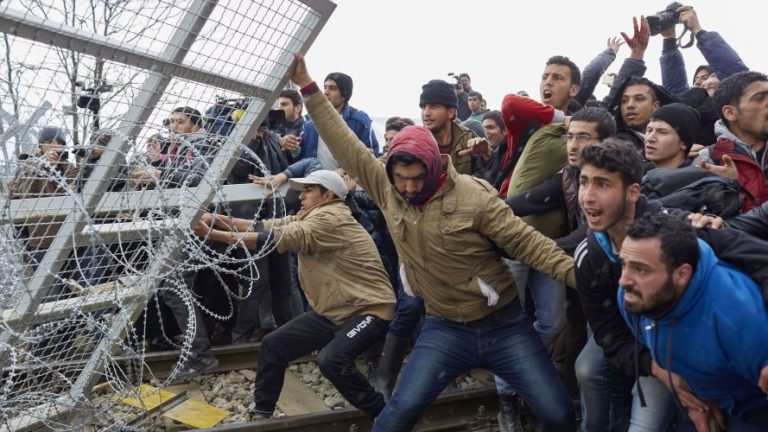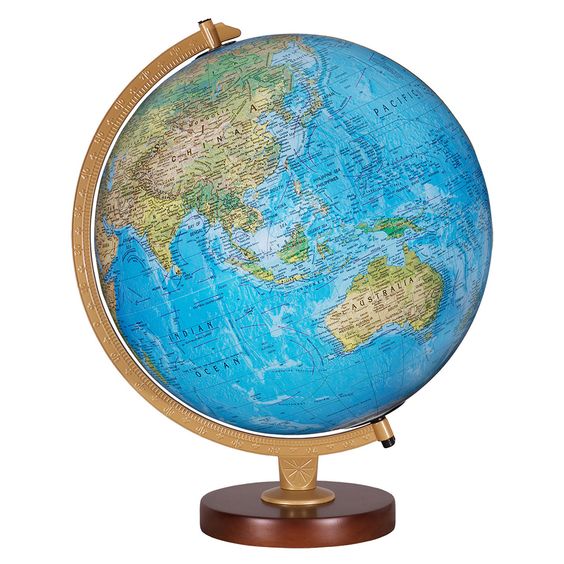
The solution does not lie simply in quotas, walls, barbed wire, African exile, indecipherable application forms or even hunting down people traffickers
By Tom Arms
There is a total absence of holistic joined up thinking on the emotive topic of immigration.
The solution does not lie simply in quotas, walls, barbed wire, African exile, indecipherable application forms or even hunting down people traffickers.
It needs to be recognized that the human souls washing up on the shores of the developed world did not materialize out of the ether. And furthermore, that demographic realities dictate that immigration is not an unalloyed evil.
But politicians—especially the more populist variety—prefer to pander to an electorate which has been fed a diet of fear of cultural and racial pollution. They offer short-term solutions and headline-grabbing sound-bites while failing to acknowledge the causes or offer long-term resolutions.
The fact is that immigrants are being driven northwards by basic survival instincts. If given the choice, few people would choose the maybes of immigration over the safe certainties of family, financial security and their own familiar culture. Millions of Palestinians and Syrians have lived for decades in overcrowded refugee camps because they nurture the dream of returning “home.”
Unfortunately, the home grown safety nets are being destroyed in increasing numbers by war, famine, and climate change.
There are currently famines in Afghanistan, Haiti, Nigeria, Somalia, Ethiopia, Eritrea, South Sudan, and Madagascar and throughout the Sahel Region to name but a few. There are wars in the Middle East, Africa, South East Asia and South America. Gang Warfare in Central America has displaced 600,000 people.
There are 900,000 Rohingya refugees in Bangladesh; six million Syrians in refugee camps in five countries and 2.7 million Afghans who have fled the Taliban. The UN High Commissioner for Refugees (UNHCR) reported recently that there are 108.4 million displaced people in the world—the largest at any time in history.
Climate change is causing the world’s deserts to grow, displacing even more people. Scientists reckon that by 2050, 25 percent of the world will be desert. The Sahara is expanding by 30 square miles a decade. Even faster-growing is the Gobi Desert in Mongolia and Northwest China. 2023 is the hottest year on record with temperatures reaching 58 centigrade in the Sahara, 50 in India and 48 in Kuwait.
If people in the safe, comfortable developed world want to stop the immigrant flow than they must encourage the conditions that allow immigrants/refugees to stay at home. Security must be enhanced. Aid increased. Investment expanded. Helping the developing world to develop is no longer a philanthropic exercise. It is a political and economic necessity.
The immigration debate is further complicated by the demographic time bomb. Birth rates in the developed world are falling or stagnating and dramatically rising in the developing world. In virtually every developed world country women are giving birth to substantially less than two children each. In China, the birth rate is only 1.28 children per woman.
This means that the developed world’s ageing population with its complex welfare systems will become dependent on a shrinking work base to support it. Also that the GDP growth which maintains high standards of living will stagnate or reverse. It is no surprise that the developed country with one of the highest immigration levels—Canada—also has one of the highest rates of GDP growth. Production requires people to produce.
While Western populations are shrinking those of the developing world are rapidly expanding due to improved health conditions and the tradition of large families. African women produce 4.4 children each. In the Arab world the figure is 3.14 and in India and South America the birth rate hovers around the replacement level of 2 child births per woman.
Perhaps the biggest problem is that adequately dealing with immigration is against the political interests of right-wing governments
The high birth rate coupled with wars, political insecurity, climate change and lack of aid and investment has created a huge pool of idle labor. Unemployment levels in Mozambique are 30 percent, the Congo 21.5 percent, Namibia 20.5 percent…. Young men and women need jobs and security and they are being driven northwards to Europe and America to find them.
As the refugees reach the borders of the developed world they are met with a wall of bureaucracy, border guards, and literal bricks and steel to “disincentivise” them from proceeding further and eventually turn back.
Bureaucracy is a major problem for these wannabe immigrants. In the case of the UK there is a clear lack of political will to streamline the application process for immigrants/asylum seekers/refugees/work permits even tourist visas. Since Brexit, the backlog of asylum applications has grown each year so that in December 2022, a record 161,000 were awaiting a life-changing decision. It is little wonder that an increasing number resort to people traffickers and flimsy boats.
The UK—and other governments—need to employ more people to process applications and streamline and simplify the process.
Perhaps the biggest problem is that adequately dealing with immigration is against the political interests of right-wing governments. Most of them were elected by voters fearful of a foreign wave washing away their national identity. Governments have exploited—and in some cases created—fear of immigrants to win and keep votes.
Solve the problem and they remove the need for their remaining in office. So they continue to stoke the fires and refuse to address either the cause or the effect.
But this will not stop the flow of people driven by a natural instinct for survival. They will continue to press against the dam of disincentives until….
 World Review
World Review
Pakistan is sliding back into military rule
Pakistan is sliding back into military rule. Actually, it never really left it. The military and its friends in the intelligence services have for decades been the puppet masters pulling the strings of successive nominally democratic governments. Quite often they don’t even bother with the veneer.
Imran Khan knew this. That is why he came to a modus vivendi with the army early in his premiership. Unfortunately for the cricketing star that arrangement did not last. He tired of both the orders and the corruption and decided to be his own man and clear the Augean Stables. Unfortunately he ended up being cleared out himself.
He is now languishing in goal and barred from elected office. His crime was failing to report an estimated $600,000 in gifts from foreign dignitaries. It is an interesting crime. If properly enforced a large chunk of the Pakistani political establishment would be sharing Imran Khan’s jail cell.
Not satisfied with jailing their opponent, the military have also organized a postponement of elections. Under the Pakistani constitution, elections have to be held within 90 days of the dissolution of parliament. The Pakistani parliament was dissolved on Thursday, but new army-friendly Prime Minister Shehbaz Sharif said elections would be “postponed for several months”. This was ostensibly because the electoral commission needed time to re-draw constituency boundaries following the acceptance of a census report just last week.
But before dissolution, the government did manage to rush through two bills increasing the powers of Pakistan’s omnipresent intelligence agencies. They can now search and arrest anyone they suspect of a “breach of official secrets”. Furthermore, anyone who reveals the identity of an intelligence agent will now be automatically sentenced to three years in prison.
Possibly in anticipation of this new law, 157 Pakistani political activists “disappeared” last month.
***
George Orwell famously wrote in his book “1984”: “Who controls the past controls the future.”
The words are profound, wise, correct and often followed. Which is why we have two examples of history control this week. The first, perhaps not surprisingly, is out of Moscow. Vladimir Putin’s educationalists have rushed through a new secondary school textbook aimed at “educating” 16-18-year olds about the Ukrainian political facts of life.
The new “patriotic curriculum” declares that Ukraine is an “artificial state.” Russia launched its “special military operation” as part of a program of “denazification and demilitarization.” The goal of the West is to “destabilize Russia” and Moscow is “a victim of Western aggression and fighting for its very existence.”
On the other side of the world, in the sunshine state of Florida, we have another attempt to control the political debate through teaching. There the target is wokeism. To battle it, presidential hopeful Ron de Santis has employed the skills of Prager University to produce a series of history online and off-line videos.
Prager University is not a university. It is a conservative video production company run by conservative radio talk show host Dennis Prager with the avowed intent of spreading conservative values to counter the “evil liberal elitist values” of most American universities. Its videos are completely unaccredited and disavowed by most serious educationalists.
Presenters and guests for Prager U videos have included Tucker Carlson, Nigel Farage and George Will. According to Prager U videos words such as racism, bigotry, homophobia and Islamophobia “are meaningless buzzwords.” Fossil fuels are “the greenest energy.” There is no “gender pay gap” and the White race “is under attack.”
Thousands of local education authorities already use Prager U videos in their classrooms, but Florida is the first state to adopt them. They are unlikely to be the last. Texas, Louisiana and Mississippi are expected to soon follow suit.
Politicians worry constantly about their legacy. Perhaps Ron de Santis and Vladimir Putin are thinking along the same lines as Winston Churchill who said: “History will be kind to me for I intend to write it.”
***
Ever since 2008-2009 the public have hated bankers. They weren’t overly-fond of them before the financial crash. Which explains why the populist Italian government of Giorgia Meloni has curried public favor by imposing a swingeing 40 percent windfall tax on her country’s banks.
Since 2009, the public has reluctantly gone along with the idea that banks need to make money. But not too much. They want bankers to concentrate more on service and less on champagne at lunchtime. The problem is that sometimes external hard-to-control factors can cause violent swings up and down the balance sheet, mostly fuelled by changes in interest rates.
The bursting of the mortgage bubble, and low inflation followed by covid kept interest rates at historic lows for a long time. The banks made smaller but satisfactory profits and the public were happier, unless they were savers.
Then came the Ukraine War, the energy crisis, high inflation and the attempt by the world’s central banks to control inflation by raising interest banks. If the central bank rates increase then so do the rates charged to borrowers by the commercial banks. And at the moment a large number in Italy and elsewhere who borrowed money at two percent less are paying six percent interest on the same principal. This means that bank profits are going through the roof. To use the example of Italy’s largest bank, Inter San Paolo, its profits have doubled in just one quarter.
The avaricious eye of Ms. Meloni is causing disturbing ripples throughout the European banking industry. Italy’s banks are big players. Inter San Paolo has $1 trillion in assets and operates in 12 European countries and 25 others.
Italy was the only target of windfall taxes, the banks would not be so worried. But Hungary, Spain, Lithuania and Estonia have also introduced smaller—but still significant—windfall taxes on their banks. The fear is that the contagion could become EU-wide and affect the bigger financial institutions in Germany, France, the Netherlands and possibly wider afield.
***
The Irish government has no need of any windfall taxes. Its problem—if it is a problem—is that it has too much money. The government has a budget surplus this year of $65 billion. This means $12,000 this year alone could be handed over to every one of Ireland’s five million citizens.
It won’t be. Taoiseach Leo Varadkar intends to use the money to spend on building up the infrastructure and paying off the government’s debts. Infrastructure will quite likely be focused on housing. Dublin in particular has an acute housing shortage with prices and rents beyond the means of many Irish young people.
But where does the money come from? Surely the five million inhabitants have not coughed up $12,000 each. The answer is Big Tech. Apple, Google, Meta and X (formerly Twitter) among others have all based their global headquarters at Dublin’s “Silicon Docks.” Twenty-five percent of Ireland’s tax revenues are corporate.
Ireland is English-speaking, friendly, part of the world’s largest trading bloc and—most important of all—levies a tiny 12 percent of corporate tax while the rest of the EU averages 30 percent and the US ranges from 21 to 32 percent. Ireland has gambled on quality over quantity and it has paid off big time.
But wealth creates problems as well as opportunities. One problem is resentment from fellow Europeans. France and Germany especially are pressing for an EU-wide corporate tax of at least 25 percent. Another problem is political.
Debates on how to spend the money are likely to be divisive at a crucial period in Irish politics. For the first time in history Fine Gael and Fianna Fail have buried their long-standing differences to form a coalition with the Green Party. This is because of the perceived need to keep out of government the now second largest party in the Republic of Ireland—the politically suspect ultra-nationalist Sinn Fein.
At the moment Sinn Fein is leading in the opinion polls and preparing to exploit spending plans for the surplus to drive a wedge between the coalition partners and force a new election. If they win they will call for a referendum on unification with Northern Ireland which will create a whole new set of problems for Ireland, Northern Ireland, Britain, the US and the EU.
________________
 Tom Arms is foreign editor of Liberal Democrat Voice and is currently working on an update of his “Encyclopedia of the Cold War.” He also co-hosts the world affairs podcast “TransAtlantic Riff” which can be heard by clicking here: https://open.spotify.com/show/3ntjretAKNLZNFpA5ZEGDG
Tom Arms is foreign editor of Liberal Democrat Voice and is currently working on an update of his “Encyclopedia of the Cold War.” He also co-hosts the world affairs podcast “TransAtlantic Riff” which can be heard by clicking here: https://open.spotify.com/show/3ntjretAKNLZNFpA5ZEGDG